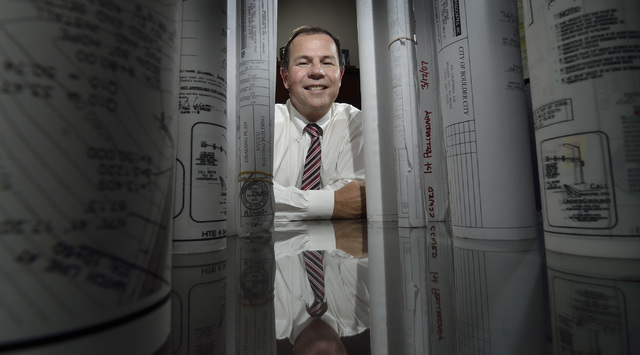Q&A with Lonnie Roy, vice president and principal engineer, Broadbent & Associates Inc.
As the principal engineer of a company specializing in environmental services, Lonnie Roy knows the importance of taking his job seriously.
“The recent chemical spill in West Virginia showed that we’re dealing with important issues,” he said. “In one sense, we’re helping clients comply with federal regulations, but we’re also protecting the community where we all live.”
The longtime Nevada resident graduated from Basic High School and attended both UNLV and UNR before receiving a degree in civil engineering from Texas A&M. He serves as vice president and principal engineer at Broadbent & Associates, and manages the Henderson office, which is the company headquarters.
Founded in 1987 in Boulder City, Broadbent is a full-service environmental, water resource and civil engineering firm with about 100 employees — 34 of them in Southern Nevada, an equal number in Reno, and the rest in satellite offices in Chico and Vacaville, Calif., and San Antonio.
About 30 percent of its business comes from state and local governments, and the rest from providing professional services to private companies.
Is the majority of your business engineering or environmental services?
Mostly environmental. Fewer than 20 percent of our employees are engineers. Most of them are scientists: environmental scientists, hydrogeologists, air quality specialists or biologists. The company started out working on leaking underground tanks in gas stations, and the petroleum industry still drives a lot of the work we do, from distribution to pipelines and railroad terminals. For commercial developments, we help clients manage industrial chemicals that may be used on-site, do permitting for storm water and handle all sorts of other environmental issues. We also have a stack testing division that uses mobile equipment to measure emissions.
What kind of services do you provide for the state?
The state of Nevada recently appointed us to its “circuit rider” program, where we send experts to wastewater plants throughout Southern Nevada to educate them on how to operate more efficiently and stay in compliance. We also provide environmental consulting services to the state through the Environmental Assessment, Mitigation and Remediation contract. If they identify an environmental problem, like a truck accident with leaking chemicals, and can’t immediately identify the owner, we get called to assess the situation, to supervise cleanup and report afterward.
What is cultural resource management?
Any work that’s done on federal land requires an environmental impact statement, which includes assessing the project’s impact on cultural resources — anything from ancient petroglyphs to historic buildings. We have a cultural resource specialist based in Reno who does these types of assessments.
How have you managed to succeed in the downturn?
When the economy wasn’t doing well in Nevada, we decided to diversify geographically, as well as broadening our scope of work. Five years ago there was enough to do in Nevada, but we now have projects in Idaho, Utah, Wyoming and Arizona. The environmental work we do is mostly complying with federal regulations, which are the same no matter which state you’re in. Five years ago we operated as five separate offices with a loose relationship. Now we’re one company able to supply all of our services through all of our offices. We make sure all our employees know that if they don’t have a specialist at their location in a particular field, that specialist is available somewhere in the company and can act as a resource for their client, either over the Internet or by flying to their office.

















